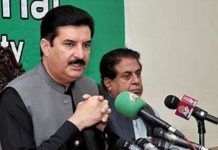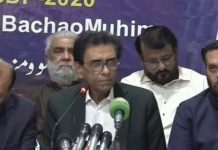ISLAMABAD /DNA/ – Laws must ensure the accountability of the State Bank of Pakistan and the accountability should rest with the government under the Prime Minister, and there should be coordination between the bank and the ministries concerned, said Dr Hafiz Pasha, former finance minister.
He was speaking at a session Understanding the Social Footprint of Central Banking & Monetary Policy in Pakistan on the occasion of 24th Sustainable Development Conference organized by Sustainable Development Policy Institute. The theme of the conference is ‘Beyond the Pandemic: Leaving No One Behind’.
Mr Pasha said that the government should bring back the inflation monitor, which kept track of inflation in different income groups as well as cities.
Hassan Daud Butt, Board of Investment and Trade, Khyber Pakhtunkhwa, said a strong and long-term policy needs to be devised and implemented to prevent the frequent changes made in the monetary policies as they hurt the business community.
SDPI’s Dr Vaqar Ahmed said the central banks should be granted a higher role and responsibility in mitigating inequality.
Dr Sajid Amin said the inflation target should be set by parliament instead of the central bank. The central bank should consistently engage with the think tanks, ministries, etc.
Accountability must be established within the central bank as well as where policy making is being done, he added.
More gender inclusive committees for policy making must be established to acknowledge the other half of the population, said Dr Alia Hashmi, Member of PM’s Economic Advisory Council. Transparency should be established in policies made by the state bank so the citizens may know the impact they will have on them.
Speaking at a session on ‘Impact of COVID-19 on Progress towards Sustainable Development Goals (SDGs) in South Asia: Challenges and Way Forward for Regional Cooperation’, SDPI Executive Director Dr Abid Q. Suleri, said that the South Asian countries need to re-strategize their work and there should an integrated agenda to fight any pandemic in future.
Mr Riaz Fatyana, MNA & Convener Parliamentary Task Force on SDGs, stated that in COVID-19 most of the SDGs are affected badly due to lockdown. He suggested that this is the right time that parliamentarians, stakeholders and policy makers should sit together and share their knowledge, experiences and expertise to work on UN agenda for our own sake.
Dr Fahmida Khatun, from Bangladesh said Covid-19 has badly affected education system, adding, a lot has to be done before any serious threat of new pandemic.
At a session on Micro, Small and Medium Enterprises (MSMEs) amid COVID-19: Assessment of Loss, Relief and Recovery Policies, Coping Strategies, and the Way Forward, Regional Director (IDRC) Dr Anindya Chatterjee said that lockdowns and subsequent impact on the economy caused deterioration in the livelihoods and wellbeing of common people. The informal workers and the small businesses in the rural areas suffered the most, however, innovative government programmes rescued the most vulnerable segments.
Senior Policy Specialist Mr. Faheem Sardar talked about the government efforts during the pandemic and suggested that the government should find out the needs of SMEs to undo the COVID impact for improving the business activity.
Mr Knut Ostby, UNDP, said there is opportunity in Pakistan in SMEs sector, but I think we don’t benefit from this opportunity as much. Mr Muhammad Umer Saleem Bhatti suggested that first we should have a data base of SMEs.
Speaking at a session on Building Back Better: A Roadmap for Sustainable and Inclusive Trade and Investment, Federal Commerce Secretary Saleah Ahmad Faruqui said We are facing various issues with diversity and inclusion, and it is within groups, workers and even within cities. “We are among least connected regions in the world and that has required a comprehensive strategy.” He stressed the need to target the non-traditional sectors of the economy.
British High Commissioner Mike Nithavrianakis said Pakistan deserves credit for struggling quality imports. Easier access and bilateral efforts make it a huge significant growth. “Short guidance for the new initiatives is required to build policy. Academia could be an effective tool to disseminate information. OECD is now consisting of 38 countries and the major aim is global economic integrity and to facilitate trade. Benefits should be more equally distributed to help governments.”
Huma Fakhar, CEO Map Capital said we are still in the phase of de-industrialization and this image make us not able to grow. The investors came because of the dividends ad we need funds for export industry.
Dr Syed Tauqir Shah, ReMIT International Trade Centre (ITC), said for more inclusive and sustainable development, we need to consider small and medium enterprises to get engaged through ITC.
to support competition within their economy. Policies needs to be stabilized for a longer period of time for the purpose of implementation. There is also need predictable tax reform policies.
At a session on Digital Economy: An Opportunity for Decent Work and Economic Growth, former Board of Investment chairman Haroon Sharif said digital economy has become a tool for growth in post pandemic era. He said in Pakistan we have seen that the number of services in addition to E-commerce have been introduced in health, education and cash transfers areas, etc. using the digital technology platform.
Mr Parvez Iftikhar said opportunities themselves do not yield any benefit unless properly exploited but sadly in our country the opportunities offered by pandemic in digital space have not been fully utilized.
Dr Muhamad Jahanzeb Khan said digital economy has an exponential impact on human and economic activities being the biggest driver of transformation in all the areas where humanities work.
SDPI’s Rabia Tabassum said E- commerce is an emerging policy concern for Pakistan after COVID-19 and now Pakistan has become 46th largest e-commerce market.
Ms Stephanie Choo focused on gender inequality, saying Pakistan could add US dollar 30 billion to its annual GDP by advancing gender equality through digital inclusion.
Dr Arslan Tariq Rana stated that traditionally trade is liberalized by international institutions but recently in post 2019 arena, regional trade agreements are also important tools for improving trade along with domestic policy reform in the developing countries.
At a session on Poverty Alleviation amid Graduation in Pakistan: Evidence from Field, Captain Syed Ahmed Nawaz said the mission of many company professionals, their objective is to get people out of poverty trap and enable them to achieve self-support in terminology of social protection programs. He said conventional programs help poor people to fight for survival.
Mr. Saeed Muhammad Mustafa all over 25 definitions of social protection describe poverty alleviation as primary objective of social protection.
Mr. Rashid Bajwa said poverty alleviation is kind of permanent removal of poverty from society whereas social assistance is just a part to extract some extent extreme poverty only.
Mr. Muhammad Dittal Kalhora was of the view that poverty has multiple indicators and the government should give complete package for education and Health while population is also a challenge for poverty.
Ms. Samia Liaqat Ali Khan said not only focusing on health and education is the solution to poverty but there is also a need to do a lot on infrastructure.
Mr. Fida Muahammad opined that measuring poverty is important as we need data to eradicate poverty. The one area is week which is important to know the causes of poverty.
Speaking at a session on Fighting Inequality by Promoting Diversity: Dialogue on Culture in the Post-Pandemic Time, Jami Chandio, writer and scholar, said: Cultural diversity is essential to Pakistan’s existence, but it needs to be used and developed. He said cultural diversity presents a treasure trove of opportunities within Pakistan for social and economic entrepreneurship, an example of which was the Lohooti Melo which is an important step towards celebrating cultural diversity in Pakistan. Mr Chandio, for example, highlighted the experiment of uniformity in Pakistan as a “failed hypothesis”. Despite having more than 70 languages and being home to multiple religions, Pakistan repeatedly tried, and failed, to implement a narrative of uniformity.
Dr Riaz Ahmed Shaikh, Dean Faculty of Social Sciences, SZABIST University criticized the practice of denying diversity and democracy and named it as one of the reasons behind rising extremism and radicalism within the country. He said single national curriculum is “unconstitutional” as it is in violation of the 18th Amendment. Dr Fatemeh Kamali from SDPI highlighted the role of social media in celebrating the cultural diversity of Pakistan and underscored the contributions of Afghan refugees to Pakistan’s cultural landscape.
The panelists suggested increasing tourism to all parts of the country as way to highlight the rich historical and cultural background of the country.
At a session on ‘Building Forward Better: Amid recovery from the Pandemic’, Mr. Shoaib Sultan Khan, Chairman Rural Support Programmes Network, said that the initial response to Covid-19 pandemic under the umbrella of the NCOC and the coordination among the various stakeholder was quite remarkable, however, he said this response was more challenging in the rural areas than the urban areas.
Dr. Masuma Hasan said that it is unfortunate that our successive governments did not really follow the rules or honored the conventions which could bring positive changes. She also highlighted the trauma and hardship that women underwent in the lockdown times.
Ms. Arifa Khalid Pervez, MPA from Punjab, was of the view that apart from the inclusivity factor a positive treatment to women will also be an important indicator for which the US will appreciate the Taliban govt.
Dr Abid Qaiyum Suleri, Executive Director SDPI, who also moderated the session said in his concluding remarks said despite many challenges we see light at the end of the tunnel in empowered and the enthusiastic youth.
Speaking at a session on ‘Climate Change and Health,’ Ms Rukhsana Naveed, Parliamentary Secretary, tapped upon the challenges that climate change has brought into an already struggling economy like ours, and the way the government has dealt with it. But the steps taken by the government for SDG 13 of Climate Action she said, are commendable but the issue of climate change and health must be dealt at political level as a high profile issue.
Prof Zafar Fatemi said that evidence has revealed a clear direct relationship of the infectious diseases and the climate change. The assessment of vulnerability is important along with strengthening the resilience. Countries need to calculate the carbon footprint at family and institutional level, he said adding that this calculation is hard to carry out but this will contribute significantly to mitigate the climate change.
Haris Majeed opined that there is a need for setting a framework for climate change and nutrition.
Dr Marina Romanello, Prof Anthony Costello and Dr Razia Safdar elaborated the linkages between Public Health and Climate Change.
Speaking at a session on Tobacco Control in Pakistan – Challenges and Opportunities Going Beyond the Pandemic, Dr Nausheen Hamid, Parliamentary Secretary, said that 8.6% of the population is using smokeless tobacco products having adverse health effects. She said that tax should be imposed on sugary drinks and tobacco products. Affordability and easy access of these products are the big challenges.
Dr Minahs us Siraj said Pakistan is a low-income generation country but the income generated through tobacco selling and purchase proved to be hazardous. He said that nicotine is addictive in nature as it was introduced as a pain killer in the 17th century.
Mr Asif Iqbal, MD, SPDC stressed to add more taxes on tobacco products. He said that cigarette packs having no electric stamps are not duty paid. Smuggling of tobacco products is a biggest challenge, he added.
Mr Waseem Iftekhar Janjua from SDPI said Velo is a smokeless product. Its marketing was banned, but later on it was advertised on internet by actors and singers. Smokeless products are smell-free and stain free. Regulation should be done on import of nicotine and flavored tobacco, he added.
Ms. Dania Farah from IBA, Karachi presented her study conducted on Karachi students according to which 56 % males were daily users of tobacco products.
Dr Sahana Shetiya Hegde, from Public Health Dentistry, Dr D.Y. Patil Dental College & Hospital, India said in India, 8.5% of the population is addicted to tobacco. Research showed that 42% posters displayed in schools and only 11% schools came under the criterion of tobacco-free signage.
Dr Zaruhi Grigoryan from Armenia said that biggest challenges in Armenia are law-enforcement, high affordability of tobacco products and lack of effective public awareness campaigns in this regard.
Speaking at a session on COVID and Pakistan’s Poorest Households-Lessons from Impact and Recovery of Pakistan’s Most Disfranchised Families, Ms Roshan Khurshid Bharucha, Chairperson of PPAF & SOS Village, said that daily wagers have faced a lot of problems in this global pandemic and thus helping people in making them capable of earning an acceptable lifestyle is important than letting them be the beggars.
Mr. Danyal Ahmad presented the research findings of PPAF work on the adverse effects of COVID and business lockdowns on daily wagers and self-employed.
Ms Themrise Khan, an Independent Researcher, presented the major outcomes of her research which focuses the labour migration from Pakistan and impact of COVID on that migration. She said that almost 11 million Pakistanis are working abroad, but they faced job and income losses due to lockdowns and thus were thrown out of their jobs without any support mainly from Gulf countries. She said that the government is obliged to support them under the protection law as majority of them were the only earning people in their families but theses migrants were not that much assisted.
Syed Hassaan Irfan, a visiting Lecturer at National Defence University, Islamabad presented the positive outcomes of the food drive initiated by his team in different categories like Rizqration, Rizqbachao, Rizqdaig, schoollunch, etc. He said that in Pakistan, almost 40% of population is food insecure, so they give food to families and in return ask them to send their children to schools or get technical education.
Speaking at a session on Inclusive COVID-19 Recovery: Education for Vulnerable Groups, , CEO of Idara-e-Taleem-o-Aagahi, Ms Beala Raza Jamil, said vulnerable groups living in slum areas are faced with the harshest blow during the pandemic regarding the education sector. The digital learning awareness, accessibility and application is a necessary step towards the improvement of current issues.
Mr Abbas Khan Commissioner Afghan Refugees KP highlighted the fact that during the 5th decade of hosting Afghan refugees, the group faced amplified issues regarding access to education. The schools in Afghan refugee villages were closed down, and the drop-out rate increased with noticeable child labour.

















